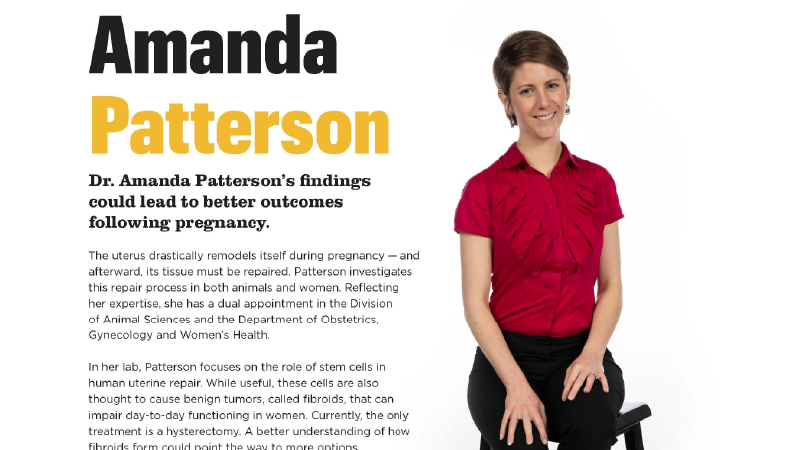Profile
Research in the Patterson lab is focused on understanding mechanisms of uterine repair in health and disease. During pregnancy, the uterus is drastically remodeled to accommodate an embryo/fetus, and following parturition, the tissue must be repaired to allow for subsequent pregnancies. The repair process includes regeneration of the endometrium and likely involves multiple mechanisms including stem cells. We are interested in understanding how stem cells function in the repair process, what regulates their activity and what happens when they are mutated or not properly regulated. When stem cells and other mechanisms of uterine repair go awry, they may contribute to diseases such as endometriosis and endometrial cancer, and we want to understand how this happens so better diagnostics and therapeutics can be developed.
Academic Information
Office
920 East Campus Drive
ASRC 163
Columbia, MO 65211
United States
Research Interests
- Mechanisms of uterine repair
- Uterine stem cells
- Uterine fibroids
- Cancer stem cells
Areas of Expertise
- Uterine regeneration
- Stem cell biology
- Early implantation biology
- Mouse models of uterine function
Education & Training
Fellowship
Michigan State University
PhD
Washington State University
MS
Colorado State University
BS
Colorado State University
In the News
Publications
- Patterson AL, George JW, Chatterjee A, Carpenter T, Wolfrum E, Teixeira JM. Label-retaining, putative mesenchymal stem cells contribute to repair of the myometrium during uterine involution. Stem Cells Dev. 2018 Nov 13. doi: 10.1089/scd.2018.0146.
- Mukherjee A*, Patterson AL*, George JW, Carpenter TJ, Madaj ZB, Hostetter G, Risinger JI, Teixeira JM. Nuclear PTEN expression contributes to DNA damage response in endometrial adenocarcinoma and could have a diagnostic benefit for therapeutic management of the disease. Mol Cancer Ther. 2018 Sep;17(9):1995-2003.
- McGee D, Smith A, Poncil S, Patterson A, Bernstein AI, Racicot K. Cervical HSV-2 infection causes cervical remodeling and increases risk for ascending infection and preterm birth. PLoS One. 2017 Nov;12(11):e0188645
- George JW*, Patterson AL*, Tanwar PS, Balla A, Prins GS, Teixeira JM. Deletion of LKB1/Stk11 in the Müllerian duct mesenchyme drives hyperplasia of the periurethral stroma and tumorigenesis in male mice. Proc Natl Acad Sci U.S.A. 2017 Mar;114(13):3445-3450.
- Patterson AL, Pirochta J, Tufano SY, Teixeira JM. Gain-of-function β-catenin in the uterine mesenchyme leads to impaired implantation and decidualization. J Endocrinol. 2017 Apr;233(1):119-130.
- Kaneko-Tarui T, Commandeur AE, Patterson AL, DeKuiper JL, Petillo D, Styer AK, Teixeira JM. Hyperplasia and fibrosis in mice with conditional loss of the TSC2 tumor suppressor in Müllerian duct mesenchyme-derived myometria. Mol Hum Reprod. 2014 Nov;20(11):1126-34.
- Patterson AL and Pru JK. Long-term label retaining cells localize to distinct regions within the female reproductive epithelium. Cell Cycle. 2013 Sep;12(17):2888-98.
- Patterson AL, Zhang L, Arango NA, Teixeira J, and Pru JK. Mesenchymal-to-epithelial transition contributes to endometrial regeneration following natural and artificial decidualization. Stem Cells Dev. 2013 Mar;22(6):964-74.
- Patterson AL, Squires EL, Hansen TR, Bouma GJ, Bruemmer JE. Gene profiling of inflammatory genes in day 18 endometria from pregnant and non-pregnant mares. Mol Reprod Dev. 2012 Nov;79(11):777-84.
- Zhang L*, Patterson A*, Zhang L, Teixeira J, Pru J. Endometrial stromal beta-catenin is required for steroid-dependent mesenchymal-epithelial cross talk and decidualization. Reprod Biol Endocrinol. 2012 Sep;10:75.



